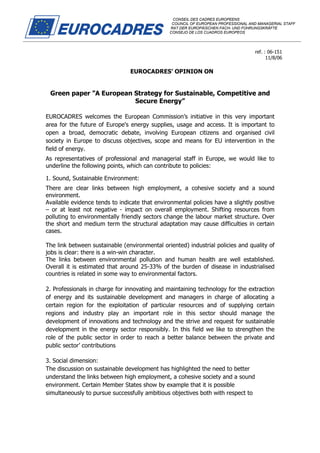Eurocadres
- 1. CONSEIL DES CADRES EUROPEENS COUNCIL OF EUROPEAN PROFESSIONAL AND MANAGERIAL STAFF RAT DER EUROPÃISCHEN FACH- UND FÃHRUNGSKRÃFTE CONSEJO DE LOS CUADROS EUROPEOS ___________________________________________________________________________________________________________________________________________________________ ref. : 06-151 11/8/06 EUROCADRESâ OPINION ON Green paper âA European Strategy for Sustainable, Competitive and Secure Energyâ EUROCADRES welcomes the European Commissionâs initiative in this very important area for the future of Europe's energy supplies, usage and access. It is important to open a broad, democratic debate, involving European citizens and organised civil society in Europe to discuss objectives, scope and means for EU intervention in the field of energy. As representatives of professional and managerial staff in Europe, we would like to underline the following points, which can contribute to policies: 1. Sound, Sustainable Environment: There are clear links between high employment, a cohesive society and a sound environment. Available evidence tends to indicate that environmental policies have a slightly positive â or at least not negative - impact on overall employment. Shifting resources from polluting to environmentally friendly sectors change the labour market structure. Over the short and medium term the structural adaptation may cause difficulties in certain cases. The link between sustainable (environmental oriented) industrial policies and quality of jobs is clear: there is a win-win character. The links between environmental pollution and human health are well established. Overall it is estimated that around 25-33% of the burden of disease in industrialised countries is related in some way to environmental factors. 2. Professionals in charge for innovating and maintaining technology for the extraction of energy and its sustainable development and managers in charge of allocating a certain region for the exploitation of particular resources and of supplying certain regions and industry play an important role in this sector should manage the development of innovations and technology and the strive and request for sustainable development in the energy sector responsibly. In this field we like to strengthen the role of the public sector in order to reach a better balance between the private and public sectorâ contributions 3. Social dimension: The discussion on sustainable development has highlighted the need to better understand the links between high employment, a cohesive society and a sound environment. Certain Member States show by example that it is possible simultaneously to pursue successfully ambitious objectives both with respect to
- 2. 2 creating more and better jobs, and to social inclusion and environmental protection, without jeopardising competitiveness. Disadvantaged groups are more likely to live and work in a poor environment. The creation of better living conditions in deprived areas could facilitate the integration of vulnerable groups into society and the labour market. The links between low quality environment and poor social conditions provide a basis for the development of new ways of combating social exclusion. Therefore well trained, environmentally aware professionals and responsible management are better able to develop innovative new techniques and integrated approaches that improve resource efficiency. This requires comprehensive lifelong learning and training systems, which integrate sustainable development concerns. Skills upgrading is necessary to respond to the needs of a more mature eco-industry. 4. Energy Dialogue: EUROCADRES believes that is important for the European Union to stand united in its relations with outside energy suppliers and must promote, via dialogues, a social dimension featuring respect for human and trade union rights, in addition to democratic principles. Dialogue can also be promoted with the stakeholders, thus involving industry, environmental organizations and communities, and encourage debate and discussions on energy-related issues. This is where management and professionals in this sector come into play, when strategic stocks need to be management soundly to the supply, demand and EU and national regulations. 5. The role of the EU a) EUROCADRES believes that the European Union can and should take on various important responsibilities in this context: â Eliminate social inequality caused by unequal access to energy services; â Work toward supply self-sufficiency â Guarantee responsible management of resources that are being threatened with depletion or scarcity in the medium-term; â Combat global warming caused by the intensive use of fossil fuels and tackle the civil and military risks involved in the use of nuclear energy; â prevent energy inflation from having an impact on wages. â Promote the external dimension of the energy policy and build up common European energy policy. â Realize a real common European energy market. b) Therefore the European Union can ensure and promote: - Strengthen public and democratic energy management - Reduce energy consumption - Ensure secure supplies - Diversify energy sources

